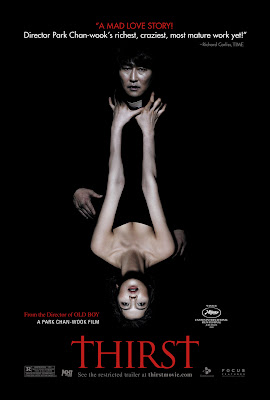
Thirst/Bakjwi/박쥐 (2009)
Country: Republic of Korea/USA
Production Company: CJ Entertainment/Universal Pictures International/Moho Films
Executive Producer: Miky Lee
Producers: Park Chan-wook, Ahn So-hyun
Director: Park Chan-wook
Screenplay: Park Chan-wook, Chung Seo-kyung, inspired by Émile Zola's Thérèse Raquin
Cinematography: Chung Chung-hoon
Editors: Kim Sang-beom, Kim Jae-beom
Art Director: Ryu Sung-hee
Music: Jo Yeong-uk
Special Effects: Kim Tae-eui
Visual Effects: AZworks/Lee Jeon-Hyeong
Costumes: Jo Sang-gyeong
Effects Make-up: Hwang Hyo-gyun, Gwak Tae-yong
Sound Design: Kim Suk-won, Kim Chang-Sup
Budget: $5M
Length: 133 mins.
Cast: Song Kang-ho (Sang-hyun), Kim Ok-vin (Tae-ju), Kim Hae-sook (Madame Ra), Shin Ha-kyun (Kang-woo), Park In-hwan (Noh), Song Young-chang (Seung-dae), Oh Dal-su (Young-du), Eriq Ebouaney (Immanuel), Mercedes Cabral (Evelyn), Lee Hwa-ryong (Professor Ku), Ra Mi-ran (Nurse Yu), Choi Hee-jin (Nurse), Choi Jong-ryeol (Old man)
Synopsis: Catholic priest Sang-hyun, who lives to aid the afflicted, volunteers to enter a program in Africa to help eradicate the fatal Emmanuel virus. The disease quickly takes hold, and after a blood transfusion he dies on the operating table but revives seconds later. Returning home, he is greeted as a healer and approached by Madame Ra to help her son, Kang-woo. The Priest begins to realize that the only way to treat his recurring skin infection is to drink human blood and as the need for food increases, along with his strength, he becomes attracted to Tae-ju, Kang-woo's downtrodden wife, and their desire for each other soon causes Sany-hyung to renounce the Church as the two hatch a plot that will allow them to remain together forever.
Review: Park Chan-wook was drawn to Thérèse Raquin, Émile Zola's tale of doomed lovers haunted by their misdeeds, by its lack of sentimentality which meshed with his long-planned idea to make a more realistic vampire movie. By stripping the form of its tropes and clichés – except, crucially, the sensitivity to sunlight – Park has created an interesting but flawed piece that, at its most interesting, traces a good man's fall from grace.
Park regular Song Kang-ho (JSA: Joint Security Area, Lady Vengeance; Bong Joon-ho's The Host), and Kim Ok-vin (Girl's High School Horror: Voice), make an effective vampire couple, he a man of the cloth reduced by desires he despises, and she, the vampire he made, embracing the kill and slowly dominating the relationship.
Sang-hyun's descent forms the backbone of the film, and his trip to Africa, meeting with Dr Immanuel (French actor Eriq Ebouaney, star of the cops vs robbers vs zombies film La Horde) and his decline as the disease takes hold, is well told – in particular a scene where he vomits blood as he plays his recorder, the instrument he had used to calm the sick). His later dealing with the onset of vampirism also provide some blackly humorous moments, as he rationalizes stealing blood from the dead and dying at the hospital he attends.
Problems arise once he returns home, bandaged like the Invisible Man and is greeted by a mob of the sick and infirm, who paw at him like Christ's lepers. While his interactions with this group are initially effective, he never seems to suffer this attention anywhere else, and a gratuitous raison d'être (including Korea's first scene of full frontal male nudity), is unnecessary and at odds with the character's arc.
As Sang-hyun falls for the seemingly fragile Tae-ju, and the main story of Thérèse Raquin takes hold, we are also introduced to Madame Ra (Kim Hae-sook, in her first film), and her idiot son Kang-woo (Shin Ha-kyun, another Park regular), whose scenes are too broadly drawn and the film begins to feel like a Hong Kong comedy, all pratfalls and screeching women. The scenes following Kang-woo's disappointingly-staged murder are particularly bothersome, with the victim returning as a comedy wet ghost, complete with the rock placed on his chest and streaks of snot pouring from his nose. This may be faithful in spirit to Zola, but here it distracts from a more interesting tale.
Thankfully Park redeems himself in the final act, as the vampire couple move into Madame Ra's house after she has a stroke, paint the interior white to simulate daylight and settle down to something like domesticity with their host, immobile but aware, her eyes blazing with hostility. Tae-ju's love of the kill contrasts with Sang-hyun's remaining humanity and the pair's nocturnal battles across the rooftops are exhilarating, as is the final atrocity in their home, as blood splashes the white walls and Sang-hyun takes his first victim purely for food.
If the ending feels a little over-familiar, Park handles it well, with blazes of light contrasting with the earlier muted colors (even if a pair of blood spouting whales appear to have invaded from a cheap 80s fantasy poster) and the sequence that runs up to it is brilliantly handled: a sad, virtually silent, and increasingly futile battle, played out under Madame Ra's gaze.
Thirst – the first Korean film made partially with US money - does often capture the mood of genre classics like Guillermo del Toro's Cronos and Thomas Alfredson's Let the Right One In, but at two hours and 13 minutes, it's over-stretched, even if it never quite wears out its welcome. It may have won the Jury Award at Cannes and been applauded pretty much everywhere, but we have a right to expect more from the genius director of JSA and Oldboy.
Thirst is released on DVD and On-Demand on November 17th in the US. In the UK, the film is currently on cinema release and on DVD from 25th January 2010.




Post a Comment